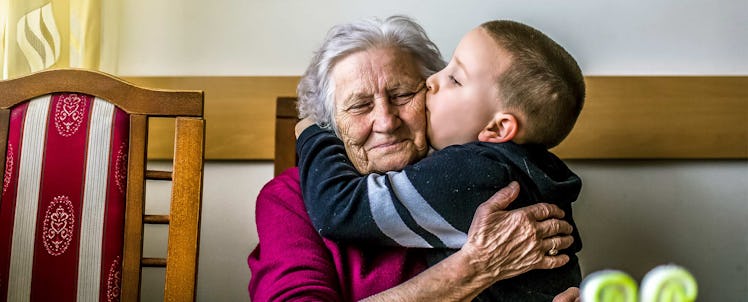Of Course Grandparents Should Ask Consent Before Hugging Kids
Asking for hugs isn't the end of the world, in fact, it's simply good manners

Earlier this week on a United Kingdom morning television show, British parenting expert Jane Evans suggested that adults should ask children permission before offering physical affection. “It’s just basic respect,” she explained. Predictably, conservative media and boomers melted down on social media, exclaiming that asking permission for hugs from kids was a symptom of snowflake-y Millennial culture run amok. The argument, it seems, is that adults in non-essential circumstances (like a medical emergency, for instance) have a right to physical dominance over a child’s body. That’s not only incredibly gross, but it’s also simply bad manners.
The symbol of the arguments in favor of forced physical affection is the archetypical grandma who is devastated after being refused a hug from her little schmoopy-kins. She is so devastated, in fact, that maybe she dies, right there in the foyer. At least that seems like the presumed outcome based on the vitriol spewed by the forced-hug crowd.
Nobody ever died from being denied a hug, of course. They may have felt sad, for a moment. And maybe they were even sad for weeks. But if you’re happiness is so contingent on whether a toddler wraps their arms around your neck, maybe you’ve got bigger issues to consider.
The fact is that Jane Evans is correct. Asking for a hug is basic respect. It’s odd that conservatives and baby-boomer parents don’t get this. They’re always harping on about manners and respect. They are, broadly, concerned with the decline of decency. As a case in point, as I was growing up, I was reminded to say please and thank you, and call adults sir and ma’am, and not speak unless spoken to and to generally not engage in any behavior that might be perceived as annoying or clingy to adults. But apparently, this respect and consideration of boundaries is not a two-way street. That seems hypocritical, to put it mildly.
Here are the facts: asking kids permission before engaging in physical contact helps them learn boundaries. Asking for consent reinforces the idea that they have autonomy over their own bodies and can control who has access and permission to touch them in an intimate way. This increases their safety. And yes, hugs are intimate physical contact. Even if the intent isn’t sexual, a body pressed against another body is pretty much the definition of intimacy. Kisses? Same. Even on the cheek.
But that exactly why grandmas and grandpas look for hugs — because they are intimate. It is a special thing to be hugged and kissed on the cheek. That touch causes the release of waves of dopamine and oxytocin. And when that rush is shared, there is bonding and good feelings of love and happiness. But when only one person actually wants the hug, the effects of the hormonal rush is sadly one-sided and may even caise the person being forced to hug to feel stress, embarrassment and in the worst cases, a sense of violation. How incredibly selfish would a person have to be to seek pleasure despite the stress of others?
The fact is that kids aren’t as cruel as we would normally assume. If a parent or grandparent were to ask if they could give a hug or a kiss, the chances are that most kids would consent, because they want to have a hug or a kiss from someone they love.
And really, what’s the big deal if they don’t consent. Do adults really want hugs from people who don’t want to hug them? Isn’t there something sick about that? Yes. The answer is yes.
And besides, it simply good manners to ask. For people who have made hay from outrage over manners, asking for hugs shouldn’t be hard. It should be required.
This article was originally published on